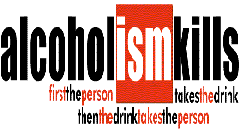|
|
| There
it is. The "A" word. You knew we'd get to it sooner or later. Of course,
we had to. This web site is about alcohol, and you can't have any
kind of serious discussion of that subject without taking an honest
look at its most insidious consequence, alcoholism. |
| Alcohol refers
to a class of chemicals compounds, all of which consist of chemically
bounded atoms of carbon, hydrogen and oxygen. |
Who
can become an alcoholic?Anyone can develop alcoholism. There is
no single characteristic shared by everyone who abuses alcohol.
An alcoholic can be any age, profession, ethnic group or social
class.
|
 |
|
Alcoholism is easy
to define: it is a diesese in which the drinking of alcoholic beverages
is a compulsion. A person who has this overwhelming need to drink
alcohol is called an alcoholic.If
you're an alcoholic, you may be aware of the negative effects drinking
is having on your life, but you're still unable to stop. The alcoholic
can't control how much alcohol is consumed or how often. If left
untreated, alcoholism's effects on the body can shorten one's life
span by as many as 12 to 15 years.
|
| WHAT'S THE DIFFERENCE BETWEEN ALCOHOL
ABUSE AND ALCOHOLISM? |
| When drinking begins
to interfere with any aspect of a person's life - social, emotional,
professional, financial, legal, or physical - it's considered alcohol
abuse. When drinking becomes addictive, either psychologically or
physically, it's considered alcoholism. Alcohol abuse, if left untreated,
can progress into alcoholism. |
| SOME COMMON MISCONCEPTIONS
ABOUT ALCOHOLISM |
 Only
people who are morally weak or have emotional problems can become
alcoholics. Only
people who are morally weak or have emotional problems can become
alcoholics. |
| * Studies show there
are no particular abnormal personality traits that cause alcoholism
to occur. In most cases, emotional problems are the result of alcoholism
rather than the cause. What's important is how much and how often
someone drinks, not what kind of person they are. |
 Alcoholics
do it to themselves. Nobody forces them to drink. They could stop
if they wanted to. Alcoholics
do it to themselves. Nobody forces them to drink. They could stop
if they wanted to. |
| * Different people
respond to alcohol in different ways. Again, we can choose how much
and how often we drink, but we can't choose how our bodies will react
to the alcohol. Some individuals can drink more than most people and
never become alcoholic. Others, with a higher level of biological
risk, can become addicted much more easily, even though they consume
less alcohol, less often. |
 Alcoholism is in your genes; if you're not born alcoholic, you'll
never become alcoholic.
Alcoholism is in your genes; if you're not born alcoholic, you'll
never become alcoholic. |
| * Research with identical
twins indicates that alcoholism is not genetically controlled - as
is, for example, eye color. (Identical twins always have the same
eye color; however, when one identical twin had alcoholism the other
twin had it only 50% of the time. If alcoholism were genetically controlled,
the ratio, as with eye color, would be 100%.) On the other hand, the
research does reveal that people have different levels of biological
risk, or trigger levels, for alcoholism. This means that if you drink
enough alcohol often enough to reach your trigger level, you run the
risk of developing alcoholism. |
| WHAT ARE SOME SIGNS
OF ALCOHOL ABUSE? |
| Alcohol abuse can
appear in several patterns. The four most common are: |
| *Regular daily drinking
of large amounts of alcohol . |
| *Drinking large amounts
of alcohol at certain times, such as weekends . |
| *Long periods of not
drinking followed by periods of heavy drinking lasting days, weeks
or months. |
| HOW CAN I TELL IF
I'M AN ALCOHOL ABUSER? |
| If you behave in any
one or more of the following ways, it could be an indication that
your drinking may be progressing into alcohol abuse: |
| *You need alcohol
to cope with strong feelings, either positive or negative . |
| *You drive a car while
under the influence of alcohol . |
| *You gulp drinks to
feel the effects more quickly . |
| *You become angry
or depressed while drinking . |
| *You can't remember
what took place while you were drinking. ("blackout") |
| *You neglect people
and events that don't involve drinking . |
| *You use alcohol to
relieve stress or sleeplessness. |
|








